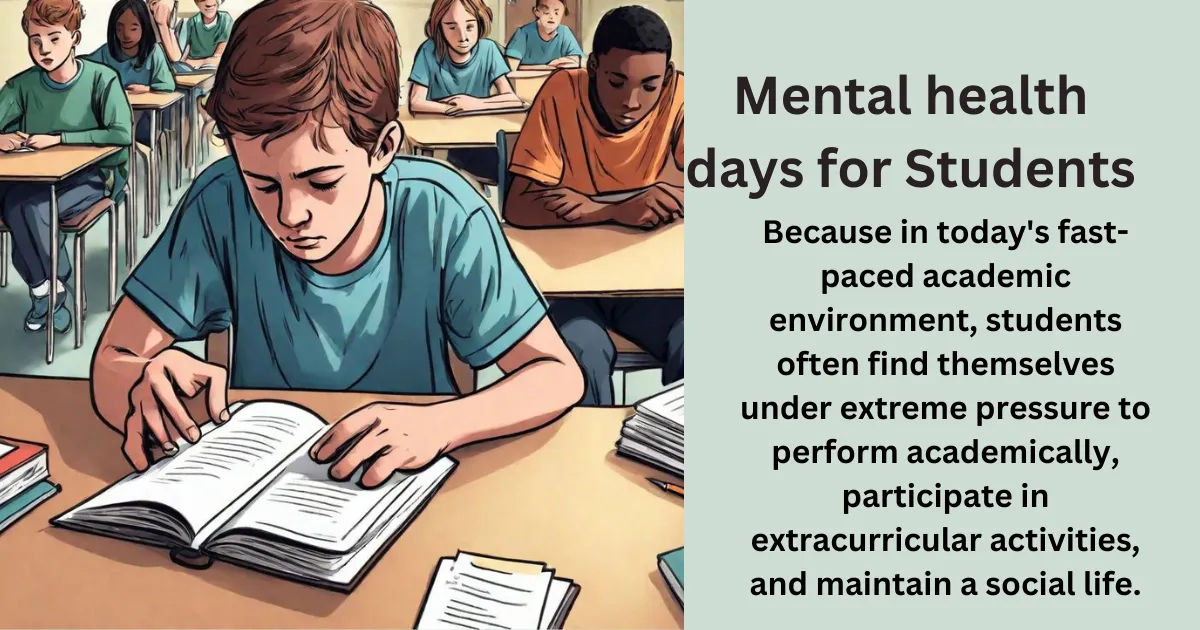Why Mental Health Days Are a Good Idea for Students
Why Mental Health Day is a Good Idea for Students In today’s fast-paced academic environment, students often find themselves under extreme pressure to perform academically, participate in extracurricular activities, and maintain a social life. This constant juggling can have an adverse effect on their mental health, leading to stress, anxiety and burnout. In such circumstances, taking a mental health day can prove to be an invaluable resource for students.
Benefits of Mental Health Days
Reduced Stress and Anxiety
One of the primary benefits of mental health days is the opportunity they provide for students to step back from their busy schedules and focus on their well-being. Taking a day off allows students to recharge mentally and emotionally, reducing feelings of stress and anxiety that may have accumulated over time.
Increased Productivity
Contrary to popular belief, taking a break from academic responsibilities can actually boost productivity in the long run. Mental health days give students the chance to rest and rejuvenate, leading to improved concentration, creativity, and problem-solving skills when they return to their studies.
Improved Overall Well-being
Regularly prioritizing mental health through days off can have a significant impact on students’ overall well-being. By taking the time to engage in self-care activities, such as exercise, meditation, or spending time with loved ones, students can cultivate healthier habits and develop coping mechanisms for managing stress more effectively.
How to Take Mental Health Days Effectively
Recognizing the Need for a Mental Health Day
It’s essential for students to recognize when they need a mental health day and not hesitate to take one when necessary. Signs that may indicate the need for a break include feeling overwhelmed, fatigued, irritable, or experiencing difficulty concentrating.
Planning and Communication
Students should inform their professors, employers, or anyone else who might suffer from their absence when planning a mental health day. Clear communication helps set expectations and minimizes potential stressors associated with taking time off.
Activities for Self-care
On a mental health day, students should prioritize activities that promote relaxation and well-being. This may include practicing mindfulness, engaging in hobbies they enjoy, spending time outdoors, or simply getting adequate rest.
Overcoming Stigma
Addressing social Perceptions
Despite the growing awareness surrounding mental health issues, there is still a stigma associated with taking time off for mental well-being. Students may fear judgment or repercussions from peers or authority figures, which can deter them from seeking the help they need.
Encouraging Open Dialogue
To combat stigma, it’s crucial to foster open dialogue about mental health in educational institutions. Normalizing conversations around self-care and emotional well-being helps create a supportive environment. Where students feel comfortable seeking help and taking mental health days when necessary.
Supporting Mental Health Days in Educational Institutions
Policies and Initiatives
Educational institutions play a vital role in supporting students’ mental health by implementing policies and initiatives that prioritize well-being. This may include offering flexible attendance policies, providing access to counseling services, and promoting mental health awareness campaigns.
Providing Resources and Support
In addition to policies, institutions should ensure that students have access to resources and support systems to help them navigate challenges related to mental health. This may involve establishing peer support groups, offering workshops on stress management, and connecting students with external mental health services.
Conclusion
In conclusion, mental health days are a valuable tool for students to prioritize their well-being and manage the demands of academic life effectively. By recognizing the importance of self-care, overcoming stigma, and fostering support within educational institutions, students can cultivate healthier habits and thrive both academically and personally.
FAQs
Are mental health days the same as skipping class?
No, mental health days are a deliberate decision to prioritize one’s well-being and are taken with the intention of managing stress and promoting mental health.
Will taking mental health days affect my academic performance?
While taking time off may require some adjustments to academic responsibilities,. Prioritizing mental health can ultimately lead to improved academic performance by reducing stress and enhancing overall well-being.
How often should students take mental health days?
The frequency of mental health days will vary for each individual. It’s essential to listen to your body and take breaks as needed, without feeling guilty or ashamed.
What should I do if I feel guilty about taking a mental health day?
Remember that prioritizing your mental health is not selfish; it’s essential for your overall well-being. Practice self-compassion and remind yourself that taking care of yourself allows you to be more present and productive in the long run.
How can I support a friend who is considering taking a mental health day?
Encourage open communication and offer your support without judgment. Let them know that it’s okay to prioritize their well-being and that you’re there to help in any way you can
